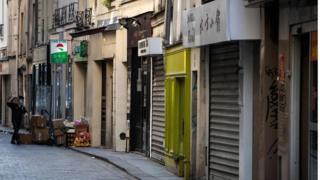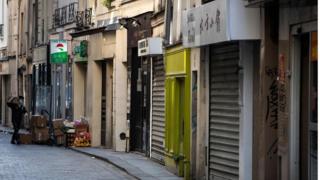Coronavirus: Worst economic crisis since 1930s depression, IMF says
Coronavirus: Worst economic crisis since 1930s depression, IMF says
-
9 April 2020
-
Share
These are external links and will open in a new window
-
Share this with Email
-
Share this with Facebook
-
Share this with Messenger
-
Share this with Messenger
-
Share this with Twitter
-
Share this with Pinterest
-
Share this with WhatsApp
-
Share this with LinkedIn
Copy this link
-
 Image copyright
Image copyright
AFP
three-quarters of the world’s workers have seen their place of work close at last partially during the pandemic, the UN sys
The coronavirus pandemic will turn global economic growth “sharply negative” this year, the head of the International Monetary Fund (IMF) has warned.
Kristalina Georgieva said the world faced the worst economic crisis since the Great Depression of the 1930s.
She forecast that 2021 would only see a partial recovery.
Lockdowns imposed by governments have forced many companies to close and lay off staff.
Earlier this week, a UN study said 81% of the world’s workforce of 3.3 billion people had had their place of work fully or partly closed because of the outbreak.
- Four out of five jobs affected by virus globally
- Coronavirus: A visual guide to the economic impact
- Global economy will suffer for ‘years to come’
Ms Georgieva, the IMF’s managing director, made her bleak assessment in remarks ahead of next week’s IMF and World Bank Spring Meetings.
Emerging markets and developing countries would be the hardest hit, she said, requiring hundreds of billions of dollars in foreign aid.
“Just three months ago, we expected positive per capita income growth in over 160 of our member countries in 2020,” she said.
“Today, that number has been turned on its head: we now project that over 170 countries will experience negative per capita income growth this year.”
She added: “In fact, we anticipate the worst economic fallout since the Great Depression.”
Image copyright
Reuters
2021 would only see a partial recovery, Ms Georgieva said
Ms Georgieva said that if the pandemic eased in the second half of 2020, the IMF expected to see a partial recovery next year. But she cautioned that the situation could also worsen.
“I stress there is tremendous uncertainty about the outlook. It could get worse depending on many variable factors, including the duration of the pandemic,” she said.
Earlier this week, the International Labour Organization (ILO), a UN agency, warned that the pandemic posed “the most severe crisis” since World War Two.
It said the outbreak was expected to wipe out 6.7% of working hours across the world during the second quarter of 2020 – the equivalent of 195 million full-time workers losing their jobs.
Secretary general Angel Gurría said that economies were suffering a bigger shock than after the 9/11 terror attacks of 2001 or the 2008 financial crisis.
![]()


